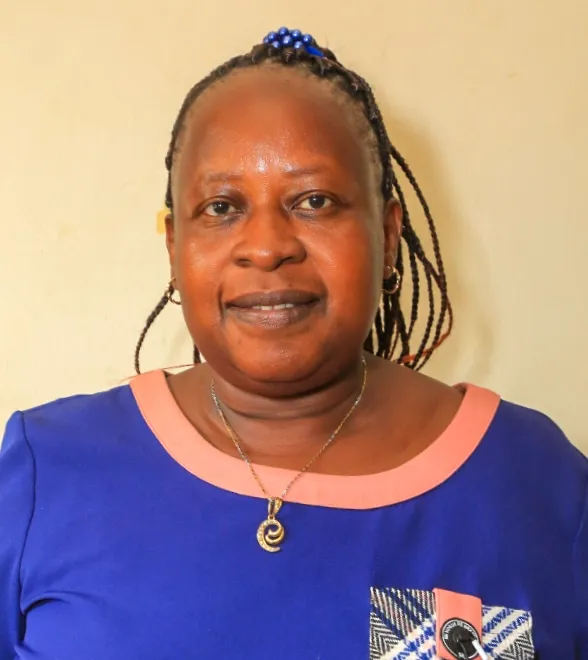Dr. Ebila is a Senior Lecturer in the Department of Gender Studies, Institute of Gender and Development Studies, Makerere University. She is also a Research Associate at the Makerere Institute for Social Research where she teaches on the Interdisciplinary PhD program. She holds a PhD and Masters in African Languages and Literature from the University of Wisconsin, Madison- USA; a Masters in Women’s Studies and a Bachelor of Arts Degree (Hons) of Makerere University. Her research interest is in gender, conflict, cultural and postcolonial. She does research on the representation of gender in African women’s autobiographies and on women in conflict situations.
She has been an Andrew Mellon Fellow (2019) carrying out research on the relationship between women’s autobiography and history; a Fulbright Scholar in Residence (2018) promoting intercultural exchange between the US and Uganda; a Cambridge Africa Research for Excellence CAPREX/ ALBARODA Postdoctoral Fellow (2017), and an African Humanities Program (AHP) Postdoctoral Fellow (2013).
ORCID ID is febila.
Courses Instructed:
- GAD 2106 Gender Identities and Representation
- GAD 3212 Gender Based Violence
- MGS 7101: Theoretical Perspectives on Gender and Development
- MGS 7209: Gender Identities and Social Representation
Research projects:
Beyond Gendered textbooks: An investigation into gender(ed) discourses in secondary English language classrooms in India and Uganda.
Publications:
- 2024: Abal, J. A. ., Ebila, F. ., Ayo, H. ., Acio, C. ., & Kabunga, A. . (2024). The influence of Uganda women’s entrepreneurship program on livelihoods and cultural dynamics in Amolatar, Northern Uganda . International Journal of Social Sciences Perspectives, 14(2), 44–51. https://doi.org/10.33094/ijssp.v14i2.1895
- 2023: Kentaro Grace Maria, Ahikire Josephine, Ebila Florence, Gender and Spirituality in Anti-Colonial Struggles in Uganda: A Case of Nyabingi Movement in Kigezi Region (1900-1945) Research on Humanities and Social Sciences, Vol.13, No.18, 2023
- 2022: Devon E. A. Curtis, Florence Ebila, Maria Martin de Almagro (2022) Memoirs of Women-in Conflict: Ugandan Ex-Combatants and the Production of Knowledge on Security and Peacebuilding. Security Dialogue. https://doi.org/10.1177/09670106211064040
- 2021: Anicent Nyangoma, F. Ebila & J. Omona (2021) Gender differentiated perceptions held for triggers of child neglect in post-conflict northern Uganda, Journal of Gender Studies, DOI: 10.1080/09589236.2021.1882295
- 2021: Ebila Florence. ‘Ugandan Women Journalists Breaking New Grounds in Conflict Reporting,’ Studies’ in Margareta Espling and Victoria Mwaka eds. (2021) Gender and Socio-Economic Change: Everyday Live s of Women and Men in Uganda. Kampala: Fountain Publishers.
- 2021: Lutwama Rukundo Evelyn, Consolata Kabonesa, May Sengendo and Florence Ebila. ‘From the Lecture Hall to the Grassroots: Transformation of Ugandan Rural Communitites by Graduates of the School of Women and Gender Studies’ Studies’ in Margareta Espling and Victoria Mwaka eds. (2021) Gender and Socio-Economic Change: Everyday Live s of Women and Men in Uganda. Kampala: Fountain Publishers.
- 2020: Ebila Florence, and Zuzana Uhde. “Feminist Perspectives on Social Struggles in Eastern Africa.” Gender a vyzkum / Gender and Research 21.1 (2020): 3-17.
- 2020: Florence Ebila. ‘Loss and Trauma in Ugandan Girls’ Ex-Child-Soldier Autobigraphical Narratives: The Case of Grace Akallo and China Keitetsi.’ Journal of a/b Autobiography Studies Vol. 35, 2020- Issue 3: The Textualities of the Autobiographical. https://doi.org/10.1080/08989575.2020.1759871 . pp 533-555
- 2019: Anicent Nyangoma, Florence Ebila & Julius Omona (2019) Child Sexual Abuse and Situational Context: Children’s Experiences in Post-Conflict Northern Uganda, Journal of Child Sexual Abuse, 28:8, 907-926, DOI: 10.1080/10538712.2019.1660445
- 2017: Florence Ebila and Aili Mari Tripp, “Naked Transgressions: Gendered Symbolisms in Ugandan Land Protests,” Journal of Politics, Groups and Identities, Routledge, Vol 5. Issue 1: Body Politics. DOI:10.1080/21565503.2016.1273122, pp.25-45
- 2015: Florence Ebila. ‘A Proper Woman, in the African Tradition’: The Construction of Gender and Nationalism in Wangari Maathai’s Autobiography Unbowed, in Tydskrif Vir Letterkunde 52 (1) 2015 available at www. Letterkunde.up.ac.za/argief/52_1/10 Ebila WEB
- 2006: Uganda: Mainstreaming Gender into the Policy: Examining the Uganda’s Gender Water Strategy,” first published by the UN in 2006 under Gender Water and Sanitation, Case Studies and Best practices at http://www.un.org/esa/sustdev/sdissues/water/casestudies_bestpractices.pdf and also available at the Directorate of Water and development website: http://www.dwd.co.ug
- 2002: Florence Ebila. “Women Watering the Literary Desert,” A Chapter in The Women’s Movement in Uganda, edited by Aili Mari Tripp and Joy Kwesiga 2002, Fountain Publishers, Kampala.
- 2001: Florence Ebila “Negotiating Gender Relations and Socialization Through Oral Poetry in Lango Society.” Department of Women and Gender Studies, Occasional Paper Number 10.

